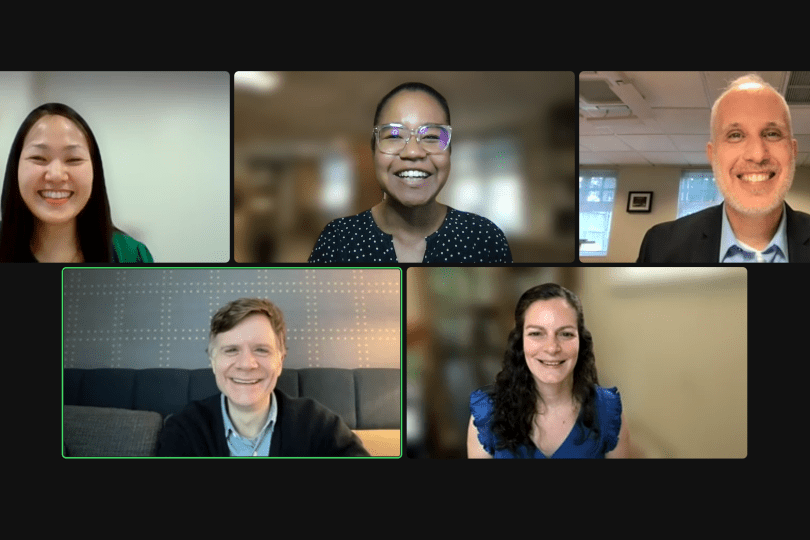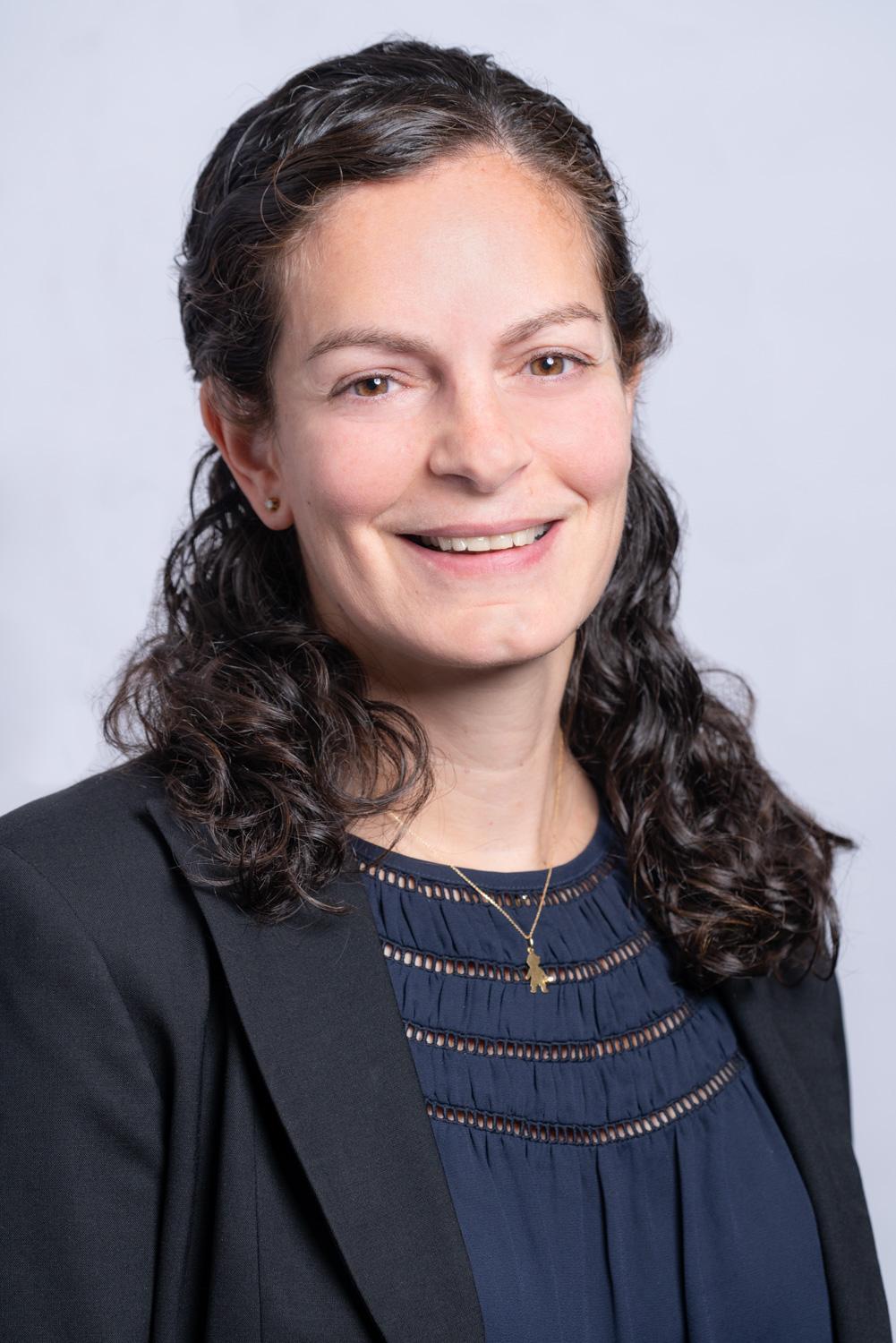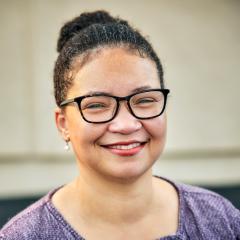Zeena Zakharia Celebrates Ordinary Solidarities in June 2023 Indigo Talk
The Ikeda Center’s 30th anniversary year calendar of events continued on June 15, 2023, with the third Indigo Talk, this time featuring Zeena Zakharia, Assistant Professor of International Education Policy at the University of Maryland at College Park.
When the Indigo Talks series was launched in 2021, the world was submerged in the forced isolation of the global pandemic, so Zoom was the medium of choice for hosting events. As so many have discovered over the last three years, our responses to hardship and limitation can bring unique value into the world. This certainly was the case when Ikeda Center events went virtual, making it possible for people from dozens of countries around the world to participate in Center programing. Given that positive outcome, it was decided to continue Indigo Talks in that form, even though restrictions have now been lifted. Because of that decision, more than 100 people from eleven countries were able to attend Dr. Zakharia’s talk, which was called “Ordinary Solidarities and the Restoration of Humanity.”
After welcoming the attendees, Center Outreach Manager Anri Tanabe shared brief thoughts on the mission of the Ikeda Center and the intentions guiding the Indigo Talks. Founded by Daisaku Ikeda in 1993 upon the delivery of his second Harvard lecture, “Mahayana Buddhism and 21st Century Civilization,” the Center has been devoted to dialogue across differences for three decades now. But dialogue in the deepest sense intended by Ikeda, said Tanabe, should be understood in the terms of his hope that the Center “would be a ‘spiritual sanctuary’ where people, in his words, ‘can come to heal the wounds of the alienated lesser self and open pathways to their true self, the greater self.’” Introducing the Indigo Talks, she said that the name comes from the Buddhist saying, “from the indigo, an even deeper blue.” In other words, just as items repeatedly dyed with indigo turn bluer than the indigo itself, the Chinese allegory of the indigo plant illustrates the impact learning has on deepening one’s wisdom, courage, and compassion.
Tanabe then introduced Dr. Zakharia, noting how “her research examines education in contexts of conflict and advances a critical approach to refugee studies in the Middle East.” Referencing the planning sessions for the talk, Tanabe said “we have truly enjoyed every opportunity we’ve had to engage in dialogues with her and are very excited for her talk tonight,” noting that her remarks would “explore resonances between her important work and Daisaku Ikeda’s philosophy of peace.” In particular, and in keeping with all Ikeda Center events during the 30th anniversary year, she would be engaging with ideas from the 1993 lecture.
Ordinary Solidarities in the Experience of One Lebanese School
During her remarks, Dr. Zakharia illuminated the ways that a single, small school in Lebanon, simply by acting in accord with its own deeply internalized values, has served as a microcosm for best practices in overcoming the pitfalls associated with international aid and education efforts in the post-colonial world. Before launching into a description of key findings from her research conducted at this school, Zakharia opened with an excerpt from the poem “Home,” by Warson Shire.
no one leaves home
unless home is the mouth of a shark.
you only run for the border
when you see the whole city running as well.
you have to understand,
that no one puts their children in a boat
unless the water is safer than the land.
no one spends days and nights in the
stomach of a truck feeding on newspaper
unless the miles traveled
means something more than the journey.
And, yet, said Zakharia, the world is currently experiencing the displacement of 89.3 million refugees, she said, “constituting the largest number of forcibly displaced people in history and more than double the number just a decade ago.” And, as the poem describes, these people face hardships nearly beyond the comprehension of most of us. She added that her own concern from this issue is shaped not only by her scholarly experiences and commitments, but from her “own experience of displacement due to conflict.”
Turning to Ikeda, she said that refugees have been a “recurring concern in his peace proposals,” quoting his conviction that “no one, wherever they may have been born or whatever group they belong to, should be subjected to discrimination, exploited, or have their interests sacrificed for the benefit of others.” Central to his concern, she added, is his commitment to educational opportunities for refugee youth, as well as his desire “to rehumanize discourse around migrant and refugee populations.” The other aspect of Ikeda’s thinking that Zakharia highlighted was his consistent employment of a conceptual framework in effective actions on behalf of society in which there is continuous interplay between 1) global systems, 2) the actions of individuals and collectives, and 3) one’s own inner work.
All these factors were in play at the Lebanese school she studied, which she dubbed “Our Faith School,” which, as Zakharia showed during her talk, was singularly effective in integrating Syrian refugees during the period of turmoil following the 2011 war in Syria. This was no small feat, considering how the influx of an estimated 1.5 million refugees into Lebanon caused considerable tensions, with many Lebanese seeing the refugees as “an economic, physical, and symbolic threat.” Indeed, the country was frequently “marked by explicit acts of discrimination, stereotyping, scapegoating, and violence against Syrian refugees.” Given this context, the achievements of Our Faith School were remarkable.
Zakharia described an atmosphere at Our Faith consciously created by school staff to emphasize not just inclusion but happiness and joy. The school’s “dingy concrete facade,” she said,
belied a child-friendly school with brightly painted walls. The summit hallways and classroom doors were aligned with student work and from the ceiling hung decorations in celebration of the upcoming winter holidays. Backpacks hung on hooks and in cubbies and posters reminded students of their values of kindness and care. During my visit, I noticed the inner courtyard that served as the school’s main sports and play area, and that awaited students whose voices could be heard over closed doors. On an upper level, kindergartners joyfully clamored up the stairs for playtime in another covered open air playground. And as they made their way, they counted the steps.
And the level of integration at Our Faith, added Zakharia, was atypical for Lebanon, with half the school Lebanese while “the other half came from other backgrounds including Syrians, Kurds, Armenians, and displaced Iraqis.” They also enrolled children of local domestic workers. To achieve this, Our Faith was financially supported by what Zakharia described with the pseudonym, International Faith Ministry. Not all of the local Lebanese families kept their children in the school as more and more refugees were integrated, but those who did appreciated the school’s success in creating an environment that was, as Zakharia described it, special by any standards.
One of the defining features of Our Faith was a “family-like atmosphere” that was “collegial and non-hierarchical, at least not overtly so.” Zakharia recalled being particularly struck “by the respectful relationship between the dean [and] the custodial staff member who came in when I was chatting with the dean and who cracked a joke while extending herself to offer a cup of coffee.” This “signified an atmosphere of kindness and care and an attitude of non-discrimination,” said Zakharia.
Crucial to understanding these aspects of Our Faith was a perspective that the dean offered frequently and in many forms. This was that “we’ve never devised a system for the Syrian parents. The school system applies to everyone.” And, “we don’t have a big strategy. We just try to encourage people to accept each other.” Instead, explained the dean, what they would do was conceive of all school activities in terms of being in “a loving community.” And this includes, by definition, principles of love and respect. For Zakharia, these characteristics of Our Faith School represented an effective, organic realization of the kind of solidarity, defined by Bajaj and Tow, which “challenges inequities, injustice, and colonialism as part of the daily practice of an engaged community grounded in a concrete sense of justice.”
One of the great triumphs of the approach modeled by Our Faith and its partners, emphasized Zakharia, was the manner in which they avoided the pitfall, common to international aid and education work, of what is called “saviorism.” Too often, aid work takes the form of outside agencies dictating to local populations what should be done in response to a crisis, since they think they know better, or as Zakharia phrased it, because they possess “epistemic authority.” Instead, said Zakharia, Our Faith School’s example ‘suggests that ordinary solidarities demand a shift in orientation from saviorism to care, which derives from a degree of vulnerability through which partners come to know one another’s struggles, needs, and desires. Importantly, care sustains solidarity through crises.” In this manner, “it fosters empathy and it reduces the risk of discrimination among partners.” This shift, in turn, naturally “counters racism and coloniality,” emphasized Zakharia.
The principles of ordinary solidarity, as evidenced at Our Faith, said Zakharia, “are also suggestive of the inner transformation required of this work, deepening our sense of interdependence and our compassion and care for others.” This notion was central to Mr. Ikeda’s 1993 lecture, she said. In it, he spoke of what Shakyamuni Buddha called an “invisible arrow” piercing the hearts of people, which, in Ikeda’s view is “the arrow of a discriminatory consciousness, an unreasoning emphasis on difference.” Crucially, states Ikeda, this arrow
is not to be found in races or classes external to ourselves, but embedded in our own heart. The conquest of our own prejudicial thinking, our own attachment to difference is the guiding principle for open dialogue, the essential condition for the establishment of peace and universal respect for human rights.
This message, said Dr. Zakharia, is one of “solidarity, peace, and human restoration.” Thus, she concluded, “through a deepened understanding of our dynamic interdependence, working against the invisible arrow and acting from our true self, our greater self, we might reorient humanitarian relationships into ordinary global solidarities, and in turn, move the world and ourselves toward restoration of humanity.”
Q & A: Deep Motivations
During the Q and A session, audience queries enabled Dr. Zakharia to both flesh out many of the core themes of her talk and address new topics. A few of these are shared here. One new topic was the question of how the school handled any “disconnects” between the school and students’ homes. Noting that this would “depend on the nature of the disconnect being referred to,” Zakharia said that the school definitely “extended themselves to families” in order to understand “their particular needs and difficulties.” It’s true, she added, that sometimes families have different goals and understandings, which means that “only through dialogue and mutual learning” can schools and parents grow together. In a related question, another asked what the main factor was in the school continuing to accept students despite community opposition. In response, she said that two factors were key. First, said Zakharia, was the school’s fundamental commitment to their “fellow beings.” The other factor was that the children “were already in the community,” making it irresponsible, in the school’s view, to exclude them.
Another attendee asked Dr. Zakharia to further discuss lessons for humanitarian aid organizations. In addition to the main points she made earlier, Zakharia reiterated that Our Faith didn’t institute a program for refugees outside of what it was already doing. Rather, its response to particular needs introduced into the school by the refugee students evolved as needs evolved. This is crucial, she said. Too often in international aid work, systems and plans for interventions are set in advance and without local involvement. Thus they are static and unresponsive to real needs. Our Faith showed that programs that grow out of the shared values of the local community have the best chance to succeed.
Related to the question of values, was a question about the ways the school’s faith influence the school atmosphere. Zakharia said that she never actually discussed faith matters directly with them. But it was clear to her that “deep motivation must have been there,” fueling their “persistence.” In her view, the actions of the school personnel reminded her of Daisaku Ikeda’s thoughts on the power of “inner transformation” and his view of “faith communities as having an inner wellspring, a deep place that allows [them] to extend to others in ways that otherwise might not be possible.” Ultimately, when she thinks about Our Faith, Zakharia said she realizes that while data can tell us that students did this or that, deeper questions remain: What is a loving community? Where does it come from? And how can we bring that loving community into practice?
Conclusion: On Solidarity and Restoration
Ikeda Center Executive Director Kevin Maher opened his concluding remarks by thanking Professor Zakharia, saying, “As a scholar who embodies a commitment to peace and human dignity in both your teaching and peacebuilding, your work is both inspiring and important at this critical time.” He also expressed appreciation for the Center’s ongoing relationship with her, including her collaboration on a nuclear disarmament seminar series for university students co-facilitated with peace studies pioneer Betty Reardon and her participation in a seminar series on fostering human dignity in times of crisis. “We feel deep gratitude for every opportunity to engage with you,” he said, “and for all that we have learned in these sessions about what it means to contribute to peace in our own contexts and communities.”
Maher also expressed appreciation for Zakharia’s emphasis on human solidarity. This theme is also central to the ethos of Daisaku Ikeda, he said, especially when considered in relation to global challenges such as that of our “climate crises.” Like Zakharia, Ikeda also emphasizes the actions of regular people. Summarizing Ikeda’s view, Maher said that “it is in solidarity of the ordinary that we are able to pool our collective wisdom as well as our innate strengths and courage.” Also, “as was shared in so many of the questions, Maher said he was “struck” by the solidarity witnessed at Our Faith School, as “school leaders responded to a critical need to support the Syrian refugee students through an inclusive, integrative, relational approach.”
To conclude, Maher shared a quote from the 2001 video “Daisaku Ikeda Up Close,” which summed up the spirit of hope that pervaded Zakharia’s portrayal of the integration of refugee children into the life and culture of Our Faith School.
What we need most is to restore and revive our humanity. We must create a society where people can live with dignity, a society where people can live in peace and happiness…It may seem like a long and distant path, but I am convinced that the twenty-first century must see a movement to sow the seeds of peace, happiness and trust in every person’s heart. The seeds of a truly humane way of life. I am convinced this is the only path.

Ikeda Center staff and Dr. Zeena Zakharia


